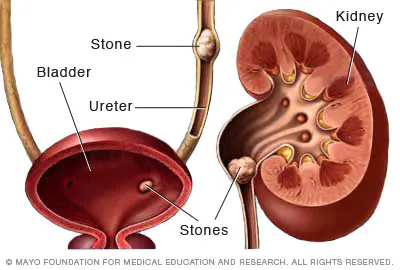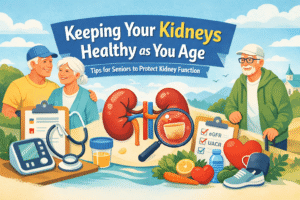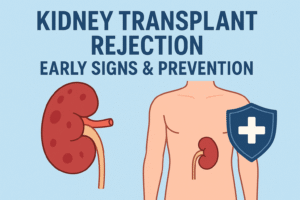Kidney stones are hard deposits, often composed of minerals, that form in your kidneys and can lead to excruciating pain when passing through the urinary tract. They can occur quite frequently, but are easily manageable with the right lifestyle changes and medical treatment.
At Southern Oklahoma Kidney Center, we specialize in providing patients with expert diagnosis and treatment for all types of kidney stones. This includes small passable stones as well as larger ones that require intervention. Knowing the potential causes, red flags to watch out for, as well as available therapies can help mitigate risks and maintain wellness proactively.
What Causes Kidney Stones?
Kidney stones form due to high concentrations of certain substances within urine such as calcium, oxalate, and uric acid. When there is a lack of fluid for these to be sufficiently diluted, they fuse together to create crystals instead.
Common causes include:
- Dehydration
- Diets rich in sodium or animal protein and oxalate
- A family history of kidney stones
- Medical conditions such as urinary tract infections or obesity
- Certain medications or supplements
As noted on our Hypertension & Kidney Disease page, high blood pressure may lead to difficulties associated with kidneys including stone formation especially if fluid balance is poorly regulated.
Identifying the Symptoms
The size of kidney stones varies from a grain of sand to the size of a marble. Symptoms typically do not emerge until the stone begins to move. Some symptoms include:
- Severe and cramping pain in the lower abdomen, back, or side
- Pain during urination
- Urine that is pink, red, or brown (indicating blood)
- Nausea and vomiting
- An urgent or frequent need to urinate
- Chills or fever (when an infection is present)
Because some overlap with urinary infections or other kidney problems, accurate diagnosis is essential. Imaging and lab tests at Southern OKC confirm quickly the type and presence of stone.
Managing Kidney Stones
Treatment focuses on the kind and whether it’s causing blockage or infection.
1. Minor Kidney Stones
In most cases, small stones can pass on their own within a few days, and physicians recommend the following measures:
- Drinking 2 to 3 liters of water each day
- Prescribing pain medications such as ibuprofen or acetaminophen
- Prescribing alpha-blockers that relax the ureter to help with passage of the stone
2. Larger or Stubborn Stones
When more aggressive intervention is necessary because stones can’t be expelled naturally, treatment options may involve:
- Shockwave lithotripsy (SWL), which uses sound waves to break stones into smaller fragments.
- Ureteroscopy involves passing a slender scope through the urethra to extract or break down the stone.
- Percutaneous nephrolithotomy is a surgical procedure used for very large stones.
The Southern Oklahoma Kidney Center works closely with urologists for more advanced procedures needing additional coordination.
Prevention Should Be Your Focus
Making better lifestyle choices helps prevent future occurrences of kidney stones, such as:
- Staying hydrated and drinking enough water during day
- Following Balanced Diet; limit salt, sugar and animal protein intake
- Reduce foods high in oxalates; spinach, beets and nuts may increase risk of developing stones
- If prescribed medication adhere to directives; certain medications can help avoid stone formation
In other related pages explaining how kidney disease along with anemia or diabetes increase risks of developing kidney stones—highlighting that effective management is crucial.
When to consult a physician
Consult a healthcare professional without delay if:
- Your pain symptom is either exceptionally intense or ongoing.
- You observe blood in your urine.
- Voiding is impossible or there is only scant output.
- Pyrexia or rigor is present.
With timely medical treatment and proper adherence to guidelines, the southern region of Oklahoma City helps relieve and control kidney stones which are often painful. At Southern OKC, dedicated professionals assist you in every step of the diagnosis, treatment, and prevention journey with empathy and unwavering expertise.
If you are coping with symptoms, wish to understand better the concept of treating and preventing kidney stones, do contact Southern OKC for an appointment today.




